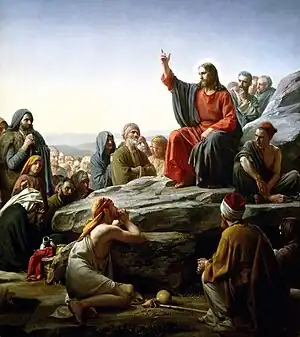The Bible Portal

The Bible (from Koine Greek τὰ βιβλία, tà biblía, 'the books') is a collection of religious texts or scriptures, some, all, or a variant of which, are held to be sacred in Christianity, Judaism, Samaritanism, Islam, Baha'i'ism and many other religions. The Bible is an anthology, a compilation of texts of a variety of forms, originally written in Hebrew, Aramaic, and Koine Greek. These texts include instructions, stories, poetry, and prophecies, and other genres. The collection of materials that are accepted as part of the Bible by a particular religious tradition or community is called a biblical canon. Believers in the Bible generally consider it to be a product of divine inspiration, but the way they understand what that means and interpret the text varies.
The religious texts were compiled by different religious communities into various official collections. The earliest contained the first five books of the Bible. It is called the Torah in Hebrew and the Pentateuch (meaning five books) in Greek; the second oldest part was a collection of narrative histories and prophecies (the Nevi'im); the third collection (the Ketuvim) contains psalms, proverbs, and narrative histories. "Tanakh" is an alternate term for the Hebrew Bible composed of the first letters of those three parts of the Hebrew scriptures: the Torah ("Teaching"), the Nevi'im ("Prophets"), and the Ketuvim ("Writings"). The Masoretic Text is the medieval version of the Tanakh, in Hebrew and Aramaic, that is considered the authoritative text of the Hebrew Bible by modern Rabbinic Judaism. The Septuagint is a Koine Greek translation of the Tanakh from the third and second centuries BC; it largely overlaps with the Hebrew Bible.
Christianity began as an outgrowth of Second Temple Judaism, using the Septuagint as the basis of the Old Testament. The early Church continued the Jewish tradition of writing and incorporating what it saw as inspired, authoritative religious books. The gospels, Pauline epistles, and other texts quickly coalesced into the New Testament.
With estimated total sales of over five billion copies, the Bible is the best-selling publication of all time. It has had a profound influence both on Western culture and history and on cultures around the globe. The study of it through biblical criticism has indirectly impacted culture and history as well. The Bible is currently translated or is being translated into about half of the world's languages. (Full article...)
Selected article -

Did you know (auto-generated) -
- ... that Samuel Green printed the Eliot Indian Bible, the first Bible printed in British America, in 1663?
- ... that the fringe belief of serpent seed claims that the Serpent mated with Eve in the Garden of Eden, and their offspring was Cain?
- ... that Francis Martin, a Cistercian monk from the Bronx, became a leader in the Catholic charismatic renewal?
- ... that the first New Testament in English was printed by Peter Schöffer the Younger in Worms?
- ... that Chninkel, a Franco-Belgian comic mixing Tolkien-like fantasy with Biblical themes, has been translated into several languages?
- ... that Annie Kanahele opposed the addition of diacritics to a reprint of the Bible in Hawaiian, arguing that the original exemplified the written Hawaiian language at the time of translation?
List articles
- List of animals in the Bible
- Biblical canon
- List of capital crimes in the Torah
- Prophets of Christianity
- List of English Bible translations
- List of films based on the Bible
- List of minor Old Testament figures, A–K
- List of minor Old Testament figures, L–Z
- List of minor biblical tribes
- List of biblical names
- List of New Testament pericopes
- List of New Testament papyri
- List of New Testament uncials
- Lists of New Testament minuscules
- List of New Testament lectionaries
- List of New Testament verses not included in modern English translations
- List of Hebrew Bible events
- List of Jewish biblical figures
- List of biblical places
- List of plants in the Bible
Related portals
Selected quote -
"He has made everything beautiful in its time. Also He has put eternity in their hearts, except that no one can find out the work that God does from beginning to end." - Ecclesiastes 3:11
Categories
WikiProjects
![]()
- WikiProject Bible
- Biblical criticism work group
- WikiProject Christianity
- WikiProject Judaism
- WikiProject Religious texts
Web resources
- Audio Bible Online
- Bible Hub
- Bible Portal
- BibleGateway.com
- BibleStudyTools.com
- Biblia.com
- Blue Letter Bible
- Free Bible Images
- Multilingual Online Bible
- The Holy Bible ,a Standard works of The Church of Jesus Christ of Latter-day Saints.
- New World Translation of the Holy Scriptures A jw.org Jehovah Witnesses portal of New World Translation of the Holy Scriptures.
Topics
More did you know -
- ...that The Sheep and the Goats or "The Judgment of the Nations" was a discourse of Jesus recorded in the New Testament? (Matthew 25:31-46)
- ...that the Northern Kingdom of Israel is sometimes referred to as Ephraim, which was the dominant tribe, and that the Southern Kingdom of Judah included Jerusalem?
- ...that Ezekiel saw a creature like a wheel and full of eyes? Ezekiel 1
Selected chapters
Genesis - Exodus - Leviticus - Numbers - Deuteronomy - Joshua - Judges - Ruth - 1 Samuel - 2 Samuel - 1 Kings - 2 Kings - 1 Chronicles - 2 Chronicles - Ezra - Nehemiah - Esther - Job - Psalms - Proverbs - Ecclesiastes - Song of Solomon - Isaiah
Associated Wikimedia
| Bible on Wikiquote Quotes |
Bible on Commons Images |
Bible on Wikisource Texts |
Sources
-
 List of all portals
List of all portals -

-

-

-

-

-

-

-

-

-
 Random portal
Random portal -
 WikiProject Portals
WikiProject Portals
